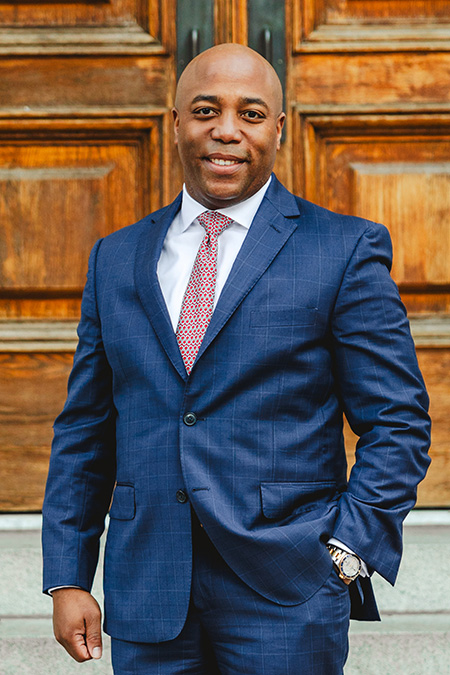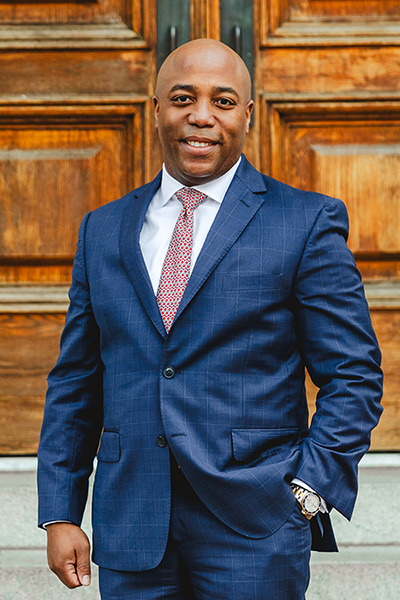
“Find the Path to Yes”: How Charles Duncan ’05 Turned Purpose into a Career in Policy
Charles Duncan’s path from Widener Law Commonwealth to the vice president of government and regulatory affairs at Comcast was paved with purpose, public service, and a passion for leadership shaped by legal and military training.
A December 2005 graduate, Duncan now leads state government affairs for Comcast in Pennsylvania and Ohio — a role he describes as “legislative, regulatory, political — all of it.” His journey into high-stakes policy began with a strategic decision to attend law school in Harrisburg, drawn by the school’s Law and Government Program.
“I was accepted at Temple and Dickinson too, but I knew I wanted to get into government — and Widener put me in the right place to do it,” Duncan said.
That decision quickly paid off. Through the support of then-vice dean John Gedid and alumni like then-state Rep. Pete Daley, Duncan secured an internship that turned into a job with the Pennsylvania House of Representatives. “Through Widener, through Gedid, through the alumni network — that’s how I got my foot in the door,” he said.
Duncan’s final year of law school took an unexpected turn. After the loss of both his father and grandmother, he transferred to Widener’s Delaware campus to complete his studies but remained deeply connected to the Widener Law Commonwealth community.
That same year, he took a constitutional law seminar taught by then-U.S. Sen. Joe Biden. Seated next to Biden for the semester, Duncan built a rapport that introduced him to the senator’s son, the late Delaware Attorney General Beau Biden — a relationship that would ultimately lead to military service.
“Beau encouraged me to join the Pennsylvania National Guard as a JAG officer,” Duncan said. “I kept putting it off, but right before I turned 35 — the cutoff age — I applied. I didn’t think I’d get in, but I would’ve kicked myself forever if I didn’t try.”
He was accepted just days after his daughter was born. “I served so my daughter doesn’t have to,” he said. “The military gave me incredible experiences, lifelong lessons in leadership, and bonds that last forever. While I’ve moved on to a different chapter in my career, I’ll always carry what I learned—and I’ll always miss my battle buddies.”
One of those formative experiences came during a 2018 deployment to Jordan, where Duncan’s legal analysis of a tragic incident involving a U.S. Army reservist reached the desk of then-Secretary of Defense James Mattis. “That taught me never to assume your work product only goes to the person in front of you,” he said. “You should always operate as though it’s headed to the top — because sometimes, it is.”
That mindset continues to guide Duncan today. Although he completed his military service in August 2023, he brings the same precision and preparation to his corporate leadership role. “In the military, especially advising generals, you don’t get to say no. You find the legal path to ‘yes.’ That mindset has stayed with me,” he said.
At Comcast, Duncan often navigates complex regulatory challenges while being technically barred from giving legal advice. But his Widener education — especially in legislative drafting and statutory interpretation — gives him an edge.
“I never really intended to practice law traditionally,” he said. “For me, law school was a platform — to learn how to draft legislation, read statutes, understand regulatory impact. Most people don’t know how to read a statute properly. Widener taught me that.”
Raised in a politically active Philadelphia household — his father an attorney, his mother deeply engaged in civic life — Duncan grew up seeing public service as a duty. He now continues that tradition through board memberships, local advocacy, and even volunteering for his daughter’s figure skating club.

“I lead by example — for her,” Duncan said. “Success starts with mindset. Whatever you believe you can do — you can. But you have to work for it. And if I say that to her, I have to live it myself.”
For current law students or recent graduates eyeing careers in policy or public service, Duncan offers this advice: “It’s not sexy in the beginning. You’ll be a grunt — low pay, long hours. But you get immediate experience and exposure. That builds the foundation for something greater.”
He also encourages aspiring policymakers to start in the trenches. “If you want to work in policy, start in a city council office or the state house. See how things actually work. Don’t skip the part where you learn the system,” he said.
And if he could offer his younger self one piece of advice? “Focus a bit more on the academics — not just the networking,” he said. “Because even if you don’t plan to practice, understanding the law deeply still matters.”
